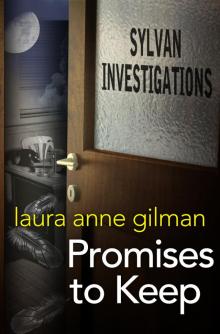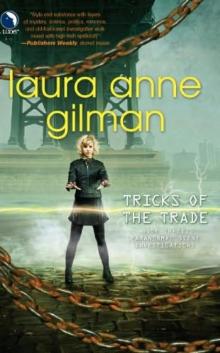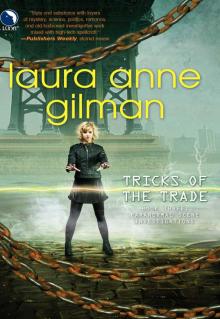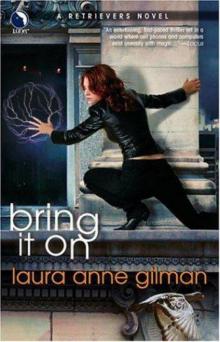- Home
- Laura Anne Gilman
Silver on the Road Page 3
Silver on the Road Read online
Page 3
The crinkles around his eyes eased a little; he wasn’t laughing now. “So I’ve heard.”
She had his measure now: likely a professional gambling man, or maybe a law’s advocate, someone who held things close. A sharp man, either way. The charm was on the surface; she couldn’t tell yet what was underneath.
“You’re one of his girls. Young for it, aren’t you?”
“Sixteen.” She put her hand on one hip, shifting her weight the way she’d seen Molly do when she sassed a man.
“Still young for this world, barely a woman grown,” he said. “But good bones, bright eyes, smart mind, and a mouth that doesn’t say half of what that smart mind’s thinking. You’ll be a handsome woman soon enough.”
“Handsome?” Her pride was stung. “Not pretty?”
“Handsome’s better than beauty,” he said, leaning back in his chair, the cards under his fingers not forgotten but put aside, for now. “Lasts longer. Does better. A handsome horse, a handsome woman, they’ll never give you grief. Pretty is heartbreak waiting to happen.”
“That’s a man’s take on it. Beauty is power.”
He laughed and moved on his cards, proving he was watching what happened at his table, too. “Power is power. A good hand of cards, a bank filled with gold, a loaded gun, a pair of fine eyes and a bewitching smile . . . The trick isn’t what you’ve been given but how you use it.”
He studied his cards, then studied her again with the same look. “A young girl with wits and looks could do well beyond Flood.”
Izzy cocked her head, looking at him differently now, studying the new turn he’d taken. “Is that an invite, mister . . .”
“Kasun. Gabriel Kasun. You’re a bit young yet for me to be offering any invites to, missy, sixteen or no. But if you happened to be out front when I ride out, I would not be unwelcoming of the company. I’ve mentored before; not against doin’ it again for the right rider.”
She stared at him, her hand still on her hip, all sass forgotten. An offer like that to come along on this of all days, only a fool’d ignore it. A mentor, someone who knew the Territory, could teach her what she needed to know, how to get by on more than her wits. . . .
“You mean that?”
He was paying full attention to his cards, not her. “I don’t offer what I don’t mean, girl.”
“Iz-sobel. My name is Isobel.” Her full name felt odd-shaped in her mouth, but she didn’t want to use her nickname, not with this man. Not when he talked to her like that.
“Isobel, then.”
The weight of the tray in her hand reminded her she had other drinks to deliver. He might have watched her as she walked off: Izzy didn’t look back to find out. She made her rounds as though nothing had changed, watching the way cards were held, the shift and lean of bodies, keeping a tally of whose glass was nearly empty and who had waved off a refill already. She couldn’t afford to think on it, not while she was working, not when she was meant to be looking and seeing, not thinking.
Eventually, she made her way back to the main table and stood behind the boss while he finished a game, waiting while the players took their winnings or left their losings. In the brief space before new players came, she gave her report. “House is clean. Nobody cheating too obvious; nobody looking to cause trouble.”
“And the young man over there?”
“He’s a sharp, passing through. Likely wanted to see how the devil’s house laid down the cards.”
“And he is satisfied?”
“Said you run the only honest game in the West.”
“Hah.” The boss seemed pleased. “And so I do.”
“He said I was handsome.”
The boss skimmed her with his gaze and smiled. “And so you are.”
“And he thinks I could do well, outside of Flood.”
The boss put his cards down and swung around in his chair. Izzy quailed inside but stood her ground. He wasn’t angry, just paying attention, hearing what she was—and wasn’t—saying.
“You could. But not because you’re handsome.”
“Because you trained me well.”
“Exactly.” He turned back to the table, new players taking their seats, and she was dismissed.
The rest of the evening kept them all busy, although true to her read, there wasn’t any trouble worth mentioning, not even an overenthusiastic drunk. She took advantage of a moment’s breather when she could, leaning a little to take the weight off her feet while she waited for Iktan to fill her orders.
“You all right, Izzy?” he asked, even as he poured out the whiskey and rye.
“I’m fine.”
Iktan didn’t look convinced, but he didn’t push, just slid the drinks onto her tray and let her be. He had to be nearly a hundred, his bronzed skin wrinkled like a dried apple, but there wasn’t a man in town who’d want to take him in a fight; the boss said he hadn’t been born so much as forged out of iron and stone, and there were some who claimed that wasn’t a joke.
But when she looked down at the tray, a stick of sugar candy was tucked between the glassware, tied with a scrap of pink ribbon. Birthdays weren’t generally fussed over, but that Iktan had remembered this one, specifically, made Izzy’s eyes itch. She blinked back the tears, and slipped the candy into her pocket for later.
Time slipped by, drinks to be served, reports to pass along to the boss. The gaming tables were all full and the noise level had risen considerably when Peggy, Molly, and William finally came down, dressed in their working best, to join the others already on the floor.
“Eat something,” Will said as he passed her then, his stern tone at odds with his boyish face and the welcoming smile he cast at a customer. “You look like half a shadow.”
Part of her rebelled at being scolded like a child, but that thought triggered the realization that their arrival meant it was past eight o’clock. Her breath caught; how could she have missed that?
Izzy looked around the room, catching a nod from the boss. Released, she ignored the supper waiting for her and fled up the stairs to her room, closing the door carefully behind her.
She had lived in this room for nearly four years, since she earned a space of her own rather than a cot in the room the younger girls shared. It was small, but there was a window that looked out over the front porch, directly into the top floor of the mercantile across the street, a narrow bed that squeaked when she turned at night, a chestnut dresser and a washbasin that had come all the way from the East, its bowl painted with green vines and tiny yellow flowers, and a wood-framed mirror set against the wall. She lit the oil lamp by her bed and stood in front of the mirror now. The last tracings of sunlight were gone, the oil lamp casting more shadows than light.
Sundown had come. She was free.
Izzy took a deep breath, watching the dim shape in the mirror do the same. She looked the same as she ever had: dark hair and eyes, the ruddy tones of her skin washed pale by shadows. Her teeth were good, and Molly had said once that her eyes were her best feature, round and wide-set. But she was nothing remarkable.
Yet the stranger had seen something in her. Handsome. Strong.
“A young girl with wits and looks could do well beyond Flood.”
Izzy made a face at her reflection. The cardsharp man—no, Gabriel his name had been, Gabriel Kasun—had thought she was unhappy here, that she wanted something more. She wasn’t . . . and she did. All the thinking she’d been doing, all the sorting and watching, and the threads of her thoughts had finally come clean and smooth, without her even noticing.
You trained me well.
The boss had taken her in, barely walking, and indentured her, the work of her hands and back at his command. Clothed her, fed her, trained her, to be . . . what? What did she want?
“Your cards, your call. All I can do is wait and see how they’re played.”
&nbs
p; One thing she knew like her own breath: it was the devil’s game, life in the Territory, but he ran it honest. Mister Kasun had the right of that. The boss would wait to see what she chose; for the first time in her life, the decision was solely her own. She could do whatever she wanted.
Mister Kasun would ride out tomorrow morning. She could be there. And maybe, in the greater Territory or beyond, she would find what suited her.
Or she could stay. And be what?
Not a saloon girl, nor a shopgirl. She had considered both, off and again, and rejected them. She didn’t like the kitchen; she wasn’t much for the stables, nor being a shopkeep girl. She wanted more.
Riding with a mentor gave her options she hadn’t considered, hadn’t even thought to consider. Riders—“road vagrants,” Marie called them, not always kindly—had freedom, could go wherever they wished, do whatever they wanted, pick up whatever skill they thought handy . . . but they were loners, too. They could go anywhere, but they didn’t have anywhere to come back to, not really.
Izzy couldn’t imagine being alone. But crossing the River into the States, with all those people, their noise and bustle . . . she couldn’t imagine that, either. And Nueva España feared those who came over the Knife, the taint of the Territory; without something to offer, some skill or wealth, they would not welcome her. North held some appeal, but she lacked the skills to become a trapper or trader; Izzy knew she’d come to grief during their cold, hard winters if she went north. And it was a lonely thing there, too, she’d been told.
All these choices, but the truth was, this was her home.
The knowing of what she wanted rose up the way waters did from streams underground, so quietly you didn’t notice until you slipped on the slicked-down stone. All those choices, like the spread of cards facedown on the table, but she’d spent her entire life learning the devil’s game . . . and she was good at it. Good at seeing underneath the bluff to what people held, what they wanted.
She looked at the girl in the mirror, and the girl smiled back at her, quiet and sly.
Bargaining with the devil was tricky, but he didn’t cheat. He never had to. Ree had been right: the devil took nothing you weren’t willing to give. Her parents had taken money and handed her over to the devil they knew rather than the copper-skinned one they didn’t. They’d abandoned her, maybe with tears and maybe not, and it didn’t matter, because she hadn’t been their daughter, the only child of Alfonso Távora and Felipa Lacoyo; from that moment on, she’d been Izzy, indentured to the Devil’s House.
And she wasn’t that Izzy any longer. Sixteen and free.
Without thinking, Izzy rose, opened the door, went to stand by the railing, looking down.
The night was in full swing. Molly was sitting in someone’s lap; William was deep in discussion with the woman in black and a freedman, the three of them leaning against the bar while the others circulated, refilling drinks and flirting, making everyone feel at home, whether they were there to gamble, gossip, or just drink their troubles away. Most of the tables were still full, and the dealers were flipping cards smooth as butter.
Marie passed behind the boss’s table, her hand touching his shoulder as she went. To Izzy’s eye, he took no notice any more than he looked up to see her standing there, but she knew he knew where they all were, every moment of every day. They were his, for as long as their contracts ran, and the devil never lost anything he cared to hold.
And he knew the things you don’t even tell yourself. He just waited until you figured it out.
Panic gripped Izzy when she woke to the sound of the blacksmith’s hammer already ringing out. The light coming through the window told her she had slept well past dawn, and she sat upright, her heart racing, before remembering that she had no duties to perform that morning.
Free.
She slipped from bed and washed up quickly at the basin, then brushed out and rebraided her hair, feeling the weight of it swinging between her shoulder blades. That done, she paused, staring blankly at the wooden brush still in her hand. With the end of her indenture, she had no responsibilities today, no chores that needed doing, no obligations or . . . anything. The lack felt like an itch under her skin, uncomfortable and awkward.
“And what do you do when there’s nothing to be done, Izzy?” she asked her reflection in the mirror. The words she’d heard nearly every day of her life came back to her, shaped by her own mouth but sounding suspiciously like Marie: “Find something that does need to be done.”
She didn’t have far to look, although the thought of it unnerved her enough that she thought for a moment to crawl back into her bed, pull the covers over, and pretend.
She placed the hairbrush on her dresser, smoothed the fabric of her skirt, and left the room.
All the bedroom doors were closed, and no one else seemed to be about, although there was the usual muted clatter coming from the kitchen when she came down the stairs. The tables were covered with their usual sheets to keep dust and dirt off the felt, the chairs tipped forward or stacked against the far wall. Somehow, she had thought that everything would change today. Instead, it felt exactly the same.
A door opened and shut above her, the wood creaking the way it always did, and someone shuffled into another room. When the saloon was open, everyone wore hard-soled shoes that tap-tapped merrily on the wood. After hours, though, the women wore sheepskin slippers, upswept hair came down over shoulders, and tired faces smiled only when they wanted to, the saloon a refuge rather than a place of business. Izzy felt guilty for wearing her shoes this early, as though she were making too much noise, but the thought of facing this in slippers . . . Izzy blanched. No, for this, she would be dressed and ready.
The boss was in his office, coffee by his elbow, the steam rising lazily into the air while he entered figures into the ledger book.
“You’re up early again, dearling.” He didn’t look up when she paused in the doorway. The boss’s office wasn’t exactly forbidden; she’d been in there often enough, usually when being scolded. But she waited anyway, and finally he sighed, closed the ledger book, and looked up at her.
The boss hadn’t aged in all the time she’d known him, but he looked . . . tired this morning. There were no windows in his office, but she thought sunlight might pick out a few more silver strands in his dark blond hair. He was clean-shaven today, his shirt open at the neck, vest undone and no cravat around his neck, so she could see his Adam’s apple move when he spoke.
“I didn’t sleep well,” she admitted.
“Not well or not at all?” He pointed at the chair opposite his desk, and she sat in it obediently. Unlike yesterday, she wasn’t wearing her best, just a simple brown wool dress that she thought made her look older, more serious. She crossed her feet at the ankle to keep from tapping her toes nervously on the floor. What had seemed so obvious, so plain, before she fell asleep last night now fluttered like a butterfly, too flighty to consider.
“Not well—barely at all,” she admitted. Her fingers twisted together in her lap, and she sighed, giving up on any pretense of maturity, solemnity, or dignity. “My indenture ended last night.”
“So it did.” He was giving her his full attention now, his eyes still arrowhead-sharp, the brown tinged with gold, his skin sun-weathered and creased. She’d always liked this look best on him. “A grown woman with her life spread out in front of her.”
His tone was teasing, but his expression was serious. She nodded, and suddenly the words, rather than being locked up in her throat, flowed easily.
“I’ve been thinking. Like you said yesterday. I’ve considered my options, and I want to stay. I want to work for you. Not the saloon, not . . . I don’t want to work the back rooms or the bar. I want to work for you.”
It had sounded better, clearer, when she’d rehearsed it in her head, lying in her bed last night. Izzy felt her skin flush, and she looked down at her fin
gers again, embarrassed.
He wasn’t going to make this any easier, reverting to the formal posture and voice he used when someone came calling for a Bargain. “What is it that you want, Isobel Lacoyo Távora?”
The sound of her family name, her birth name, brought a flash of memory, voices and warmth, but she pushed it away. The past was past. Her future was what mattered now.
“Respect.” There was no thought of lying to him or shading the desire. There was no point: if she were to bargain with the devil, she needed to be honest. This was what she wanted, what she had been bought and trained for. “Power, maybe.” You could not have the first without the second; she knew that. “To be part of what you do. To help . . .” Her mouth was so dry, but she managed to get the words out. “To be part of all this.”
“And you think to find that here, in this House? To be my faithful right hand in all doings?” He smiled, and it was both sweet and cold. “You want Marie’s job?”
“I . . . Maybe? Someday, yes.” Izzy licked her lips nervously. This wasn’t going the way she’d thought it would. In her imagining, the boss had laughed and told her he’d been waiting for her to say that, and Marie welcomed her, saying her help would be priceless, and . . .
In daylight, she saw how foolish that had been. The devil was honest, but he gave nothing away, and Marie had no reason to share, no need of help.
“Or something else,” she said. “Some way I can help . . .”
“Help what?” He was still watching her, still with that smile. It should have made her angry or uneasy, but instead, her nerves steadied. She was a free woman come to make a Bargain. She knew that look, knew him, as much as any soul might. Izzy waited, and watched him in return, the way she had watched the woman in black the last night, the way she’d watched so many other people come and go over the years. She had lived her entire life in the devil’s house, and she had no fear of him. He had taught her that, as well.
“Help you do what you’ve been training me to do all these years,” she said finally. “To see what people are, what they want. What they need. And how to give it to them.”

 West Winds' Fool and Other Stories of the Devil's West
West Winds' Fool and Other Stories of the Devil's West Gabriel's Road
Gabriel's Road Morgain's Revenge
Morgain's Revenge The Shattered Vine
The Shattered Vine Laura Anne Gilman - Tales of the Cosa Nostradamus
Laura Anne Gilman - Tales of the Cosa Nostradamus The Camelot Spell
The Camelot Spell VISITORS
VISITORS Staying Dead
Staying Dead Silver on the Road
Silver on the Road Weight of Stone
Weight of Stone Promises to Keep
Promises to Keep Tricks of the Trade psi-3
Tricks of the Trade psi-3 Blood from Stone
Blood from Stone Soul of Fire tp-2
Soul of Fire tp-2![Pack of Lies [2] Read online](http://i1.bookreadfree.com/i1/04/01/pack_of_lies_2_preview.jpg) Pack of Lies [2]
Pack of Lies [2] Burning Bridges
Burning Bridges The Work of Hunters
The Work of Hunters Miles to Go
Miles to Go Pack of Lies psi-2
Pack of Lies psi-2 Tricks of the Trade
Tricks of the Trade Hard Magic
Hard Magic Bring It On
Bring It On Darkly Human
Darkly Human The Cold Eye
The Cold Eye An Interrupted Cry
An Interrupted Cry Soul of Fire
Soul of Fire Hard Magic psi-1
Hard Magic psi-1 The Shadow Companion
The Shadow Companion Flesh and Fire
Flesh and Fire